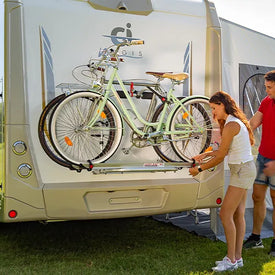Sort by:

Why Motorhomes Need Dedicated Bike Carriers
Coachbuilt motorhomes lack mountings for standard car cycle carriers and even campervans can face problems with vertical rear doors making it more difficult to use a standard tailgate bike carrier. Motorhome-specific carriers address these challenges with:
- Reinforced Mounting Systems: Attach directly to pre-installed rear-wall fixtures or towbars for minimal wobble
- High Weight Capacity: Support 2-4 bikes, including heavier e-bikes (up to 30kg per bike), with rust-resistant aluminium or powder-coated steel frames
Built-In vs. Towbar-Mounted Options
-
Built-In Carriers:
- Pros: Permanently fixed to the motorhome’s rear wall, eliminating the need for a towbar. Ideal for vehicles without towing capacity or without towbar options
-
Cons: Limited adjustability; may require professional installation to align with reinforcement points
-
Towbar-Mounted Carriers:
- Pros: Detachable designs (e.g., Thule EasyFold XT) allow boot access and suit campervans with factory-fitted towbars
- Cons: Towbar installation can be expensive for motorhomes, particularly those with chassis extensions
Top Brands for Motorhome Carriers
- Fiamma Carry Bike: Designed for motorhomes with double rear doors, featuring tilt mechanisms for easy access and compatibility with e-bikes
-
Thule VeloCompact: Roof-mounted option for campervans with existing roof bars, maintaining rear visibility and boot space
Key Considerations
- Compatibility: Verify your motorhome’s rear-wall weight limits or towbar specifications before purchasing.
- Legal Compliance: Ensure carriers do not obscure lights, number plates, or exceed payload limits.
- Maintenance: Regularly inspect bolts and lubricate hinges to prevent rust, especially after coastal trips.
Pros and Cons of Motorhome Bike Carriers
Advantages:
- Space Efficiency: Frees up interior storage for luggage or gear
- Durability: Built to handle rough terrain and long-term exposure.
-
Versatility: Options for rear-wall, towbar, or roof mounting.
Considerations:
- Installation Complexity: Some require professional fitting to avoid damage to vehicle integrity










